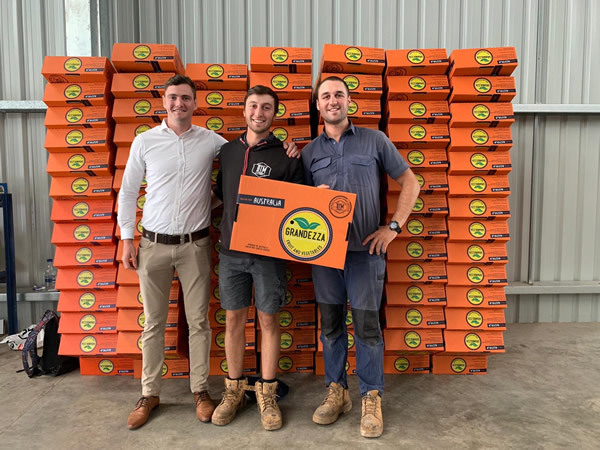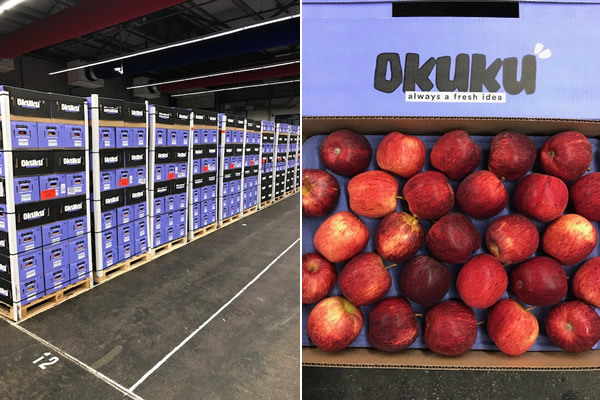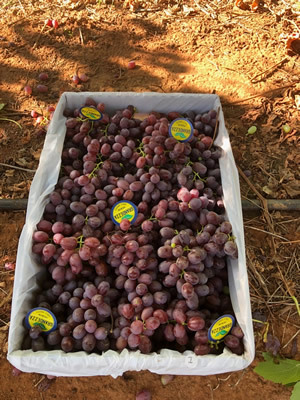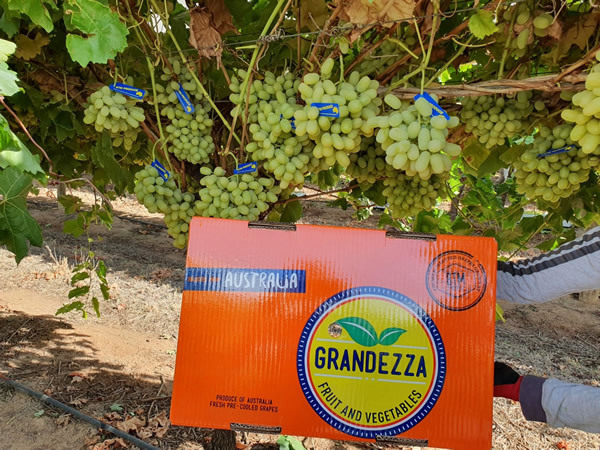The Dutch company, Aartsen, is doing well in the European and Asian markets. That is with the Australian brand, Grandezza, and the New Zealand brand, Okuku. Menno van Breemen is from Aartsen Asia and Leo van der Giesen from this company's office in the Benelux region. They discuss the importance of these brands.

What are the most important products you supply under the Grandezza and Okuku labels?
Leo: First and foremost, Grandezza and Okuku fit seamlessly into the Aartsen strategy. Aartsen wants to market the very best products with the very best partners. That can be done with these two house brands. This applies to both Europe as well as Asia. The most important products for Europe are Gala and Braeburn apples from New Zealand. These are under the Okuku label.
Menno: In Asia, we currently have the Royal Gala, Fuji, and Granny apple varieties under the Okuku mark. These have found their way from New Zealand to the Far East. In Australia, we started packing our partners' best grapes under the Grandezza brand three years ago. The ‘Orange box’ has an excellent reputation in most countries in Asia.
It is also then one of the true leading brands in the Chinese market. Our partners in Australia worked hard for this. They strive for top quality as a standard. Besides Grandezza, we have had grapes under the Okuku name in Australia for two years now. The bar is set high there too. We hope to achieve the same top position in the market here as well.

How important are the New Zealand and Australian products for your trading business? Do they mostly go to Asia? Or are these also important for sales in the Benelux region?
Menno: For Aartsen Asia, apples and pears are two of the fastest-growing products. If we look at country of origin, New Zealand takes the top spot. We still see a lot of growth potential here in all our distribution countries. The grapes from Australia are enormously popular in Asia. Since we have large volumes, we have a strong position in that market.
Leo: In Europe, we go for products from New Zealand. These are mainly apples and pears. New Zealand still always has the best apples and pears in the world. With these, Australia only sporadically comes onto the market. Pink Lady is a good example, but then again, that is a top product.
 Both these countries had to deal with dry growing seasons. How much did that affect yields and prices?
Both these countries had to deal with dry growing seasons. How much did that affect yields and prices?
Leo: Where Europe is concerned, with apples and pears, it has very little to no effect in New Zealand. We have a partner on the south island. They have now started packing Cox and Royal Gala apples.
They are currently three weeks away from packing the first Braeburns too. As far as weather conditions go, there have been no problems. There is enough water, and they are peaking at the 100 size. That is a good size.
Menno: The same applies to us. That is, when it comes to apples and pears from New Zealand. It did have a significant influence on the Australian grapes. The price of water increased dramatically in that country. That means production costs were considerably higher. In January, temperatures were extremely high. They then needed a lot of expensive water. Market prices will vary, but based on quality. Buying enough water will result in better quality compared to other products. That also means better prices.
Are you getting more competition from South America when it comes to Asian fruit imports?
Menno: We received the first grapes from Australia in min-January. The came onto a market with competition from several other countries. These include South Africa, India, Peru, and Chile. There is room on the market for grapes from all over. Even if, logically, volumes affect prices. We are noticing that Peru and South Africa are slowly disappearing off the Asian market. But Chile will have plenty of product on that market. It will be interesting to see where all this fruit will go. Especially now, with this coronavirus outbreak. We are all at the ready to offer our partners the best possible service we can.

The apple, kiwi, and onion seasons will soon start exploding. How much is the coronavirus hampering trade?
Leo: It does not, yet, have any direct effect on our import trade in the Benelux region. The goods flows are continuing as usual.
Menno: In Asia, we have been feeling the consequences since January. We are trying to deal with it as well as possible, both internally and externally. However, we are prepared for what may come. We certainly take it very seriously.
Internally in the organization, we are, of course, taking measures to defend ourselves as well as possible. This is both in the Benelux region and Asia. In doing so, we also do everything we can - once again - to provide the best possible service to our partners around the world.
For more information:
Leo van der Giessen
Aartsen
Tel: +31 (0) 765 248 166
Email: leo.van.der.giesen@aartsen.com
Menno van Breemen
Aartsen Asia Ltd.
Tel: +852 37 05 55 07
Mob: +852 93 19 80 78
Email: menno.van.breemen@aartsen.com
